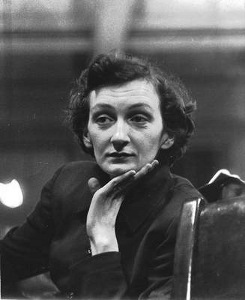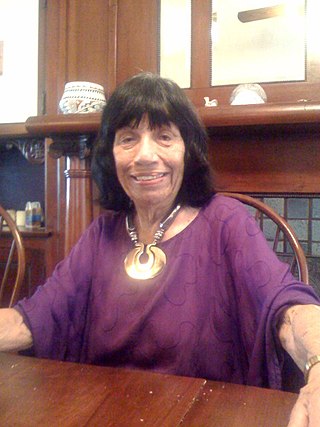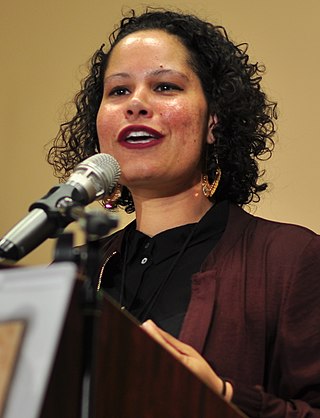Related Research Articles

Redlining is a discriminatory practice in which financial services are withheld from neighborhoods that have significant numbers of racial and ethnic minorities. Redlining has been most prominent in the United States, and has mostly been directed against African-Americans. The most common examples involve denial of credit and insurance, denial of healthcare, and the development of food deserts in minority neighborhoods.

The Congress of Racial Equality (CORE) is an African-American civil rights organization in the United States that played a pivotal role for African Americans in the civil rights movement. Founded in 1942, its stated mission is "to bring about equality for all people regardless of race, creed, sex, age, disability, sexual orientation, religion or ethnic background." To combat discriminatory policies regarding interstate travel, CORE participated in Freedom Rides as college students boarded Greyhound Buses headed for the Deep South. As the influence of the organization grew, so did the number of chapters, eventually expanding all over the country. Despite CORE remaining an active part of the fight for change, some people have noted the lack of organization and functional leadership has led to a decline of participation in social justice.
Institutional racism, also known as systemic racism, is a form of institutional discrimination based on race or ethnic group and can include policies and practices that exist throughout a whole society or organization that result in and support a continued unfair advantage to some people and unfair or harmful treatment of others. It manifests as discrimination in areas such as criminal justice, employment, housing, healthcare, education and political representation.

Seattle Public Schools is the largest public school district in the state of Washington. The school district serves almost all of Seattle. Additionally it includes sections of Boulevard Park and Tukwila. As of the 2021-2022 academic year, 106 schools are operated by the district, which serve 51,650 students throughout the city.
The anti-bias curriculum is a curriculum which attempts to challenge prejudices such as racism, sexism, ableism, ageism, weightism, homophobia, classism, colorism, heightism, handism, religious discrimination and other forms of kyriarchy. The approach is favoured by civil rights organisations such as the Anti-Defamation League. Bias refers to violation of equality based on equal opportunities or based on equality of outcomes for different groups, also called substantive equality.
The civil rights movement (1896–1954) was a long, primarily nonviolent action to bring full civil rights and equality under the law to all Americans. The era has had a lasting impact on American society – in its tactics, the increased social and legal acceptance of civil rights, and in its exposure of the prevalence and cost of racism.
Critical race theory (CRT) is an academic field focused on the relationships between social conceptions of race and ethnicity, social and political laws, and mass media. CRT also considers racism to be systemic in various laws and rules, not based only on individuals' prejudices. The word critical in the name is an academic reference to critical theory rather than criticizing or blaming individuals.

Anne McCarty Braden was an American civil rights activist, journalist, and educator dedicated to the cause of racial equality. She and her husband bought a suburban house for an African American couple during Jim Crow. White neighbors burned crosses and bombed the house. During McCarthyism, Anne was charged with sedition. She wrote and organized for the southern civil rights movement before violations became national news. Anne was among nation's most outspoken white anti-racist activists, organizing across racial divides in environmental, women's, and anti-nuclear movements.
Freedom Schools were temporary, alternative, and free schools for African Americans mostly in the South. They were originally part of a nationwide effort during the Civil Rights Movement to organize African Americans to achieve social, political and economic equality in the United States. The most prominent example of Freedom Schools was in Mississippi during the summer of 1964.

Elizabeth "Betita" Martínez was an American Chicana feminist and a long-time community organizer, activist, author, and educator. She wrote numerous books and articles on different topics relating to social movements in the Americas. Her best-known work is the bilingual 500 years of Chicano History in Pictures, which later formed the basis for the educational video ¡Viva la Causa! 500 Years of Chicano History. Her work was hailed by Angela Y. Davis as comprising "one of the most important living histories of progressive activism in the contemporary era ... [Martínez is] inimitable ... irrepressible ... indefatigable."
The Canadian Anti-racism Education and Research Society (CAERS) is a Canadian non-profit organization that tracks hate groups and extremism, provides direct support to victims of racism and discrimination, and lobbies government and governmental agencies for the development of effective policy and legislation to stop racism. The social justice law firm Rush, Crane, Guenther, provides legal counsel.
The Seattle school boycott of 1966 was a protest against racial segregation in the Seattle Public Schools. On March 31 and April 1, thousands of students left classes at their public schools, with the large majority of them attending community Freedom Schools instead.
Jewish Council on Urban Affairs (JCUA) is a nonprofit organization based in Chicago that mobilizes the Jewish community of the region to advance racial and economic justice. JCUA partners with diverse community groups across the city and state to combat racism, antisemitism, poverty and other forms of systemic oppression, through grassroots community organizing, youth education programs, and community development.
Tyree Scott (1940–2003) was a US labor leader and civil rights activist deeply involved in many minority workers’ and equal opportunity organizations.

The American Friends Service Committee (AFSC) is a Religious Society of Friends (Quaker)-founded organization working for peace and social justice in the United States and around the world. AFSC was founded in 1917 as a combined effort by American members of the Religious Society of Friends to assist civilian victims of World War I. It continued to engage in relief action in Europe and the Soviet Union after the Armistice of 1918. By the mid-1920s, AFSC focused on improving racial relations, immigration policy, and labor conditions in the U.S., as well as exploring ways to prevent the outbreak of another conflict before and after World War II. As the Cold War developed, the organization began to employ more professionals rather than Quaker volunteers. Over time, it broadened its appeal and began to respond more forcefully to racial injustice, international peacebuilding, migration and refugee issues, women's issues, and the demands of sexual minorities for equal treatment. Currently, the organization's three priorities include work on peacebuilding, a focus on just economies, and humane responses to the global migration crisis.
Aki Kurose was an American teacher and social-justice activist who helped establish Washington state's first Head Start program and worked to increase access to education and affordable housing, particularly among low-income and minority families.

Nikkita R. Oliver is an American lawyer, non-profit administrator, educator, poet, and politician. They were a candidate for Mayor of Seattle in the 2017 mayoral election, but finished third in the primary with 17% of the vote. Oliver was defeated again in an at-large Seattle city council race in 2021.

Robin Jeanne DiAngelo is an American author working in the fields of critical discourse analysis and whiteness studies. She formerly served as a tenured professor of multicultural education at Westfield State University and is currently an affiliate associate professor of education at the University of Washington. She is known for her work pertaining to "white fragility", an expression she coined in 2011 and explored further in a 2018 book entitled White Fragility: Why It's So Hard for White People to Talk About Racism.
The People's Institute for Survival and Beyond (PISAB) is a non-profit organization that provides education and training to individuals, communities and organizations on issues related to systemic racism and social and human justice. It was founded in 1980 by civil and human rights activists and scholars Ronald Chisom and James Norman Dunn. It is based in New Orleans, Louisiana with several regional organizing hubs across the country. More than two million people completed PISAB's Undoing Racism and Community Organizing workshops.
The Union of Democratic Filipinos was a left-wing organization of Filipino Americans in the United States, active from 1973-1986. The KDP embraced the goal of fighting for socialism in the United States and opposing the Marcos dictatorship in the Philippines.
References
- ↑ Henry, Mary T. "Scott, Tyree (1940-2003)". www.historylink.org. Retrieved 2020-06-17.
- ↑ Oron, Guy (September 12, 2018). "Civics, Education, Opinion, Social Justice a Day at Freedom School: Hpw Could Other Education Models Transform Our Public Schools?". South Seattle Emerald. Retrieved June 16, 2020.
- 1 2 Andom, Mary (2006-07-22). "Freedom School teaches what others don't". seattlepi.com. Retrieved 2020-06-17.
- 1 2 Nguyen, Minh (August 21, 2013). "Tyree Scott Freedom School Brings Civil Rights to the Classroom, Youth to the Mic". International Examiner . Retrieved June 16, 2020.
- ↑ "Seattle Public Schools : Data Profile: District Summary : December 2008" (PDF). December 2008. Archived from the original (PDF) on May 30, 2009.
- ↑ Perlstein, Daniel (Autumn 1990). "Teaching Freedom: SNCC and the Creation of the Mississippi Freedom Schools" (PDF). History of Education Quarterly. 30 (3): 297–324. doi:10.2307/368691. JSTOR 368691. S2CID 144992014.
- ↑ Clark, Brooke (2005). "The Seattle School Boycott of 1966". University of Washington - Seattle Civil Rights and Labor History Project. Retrieved 2025-01-03.
- ↑ "Freedom schools teach history of race, racism, local racial justice organizing". American Friends Service Committee. 2015-02-02. Retrieved 2020-06-17.
- 1 2 3 Bernard, Sarah (September 1, 2016). "Freedom School Aims to Teach What Public Schools Don't : Seattle's long-running workshop for teens has a lofty goal: dismantling systemic racism". Seattle Weekly. Retrieved June 16, 2020.
- ↑ "Letter to Councilmember Larry Gossett | Tyree Scott Leadership Institute". 2014-11-28. Archived from the original on 2014-11-28. Retrieved 2020-10-21.
- 1 2 3 Green, Marcus Harrison (2018-08-11). "Before Charlottesville and since, students in this Seattle summer school urge everyone to unlearn racism". The Seattle Times. Retrieved 2020-06-17.
- ↑ ""Freedom Reigns" at Beacon Hill's Tyree Scott Community School". South Seattle Emerald. 2014-12-28. Retrieved 2020-11-14.
- ↑ Henry, Mary T. (2007-07-24). "Scott, Tyree (1940–2003)". HistoryLink.org- the Free Online Encyclopedia of Washington State History. Retrieved 2009-02-08.
- ↑ Goddard, Tim; Myers, Randolph R. (April 2013). "Youth Justice Innovation on the West Coast: Examining Community-Based Social Justice Organizations through a Left Realist Lens" (PDF). Journal of the Western Society of Criminology. 14 (1): 53.
- ↑ Washington, Dustin; Schaefer, Madeline (2014-01-16), Tyree Scott Freedom schools: An interview with Dustin Washington, American Friends Service Committee, retrieved 2020-10-21